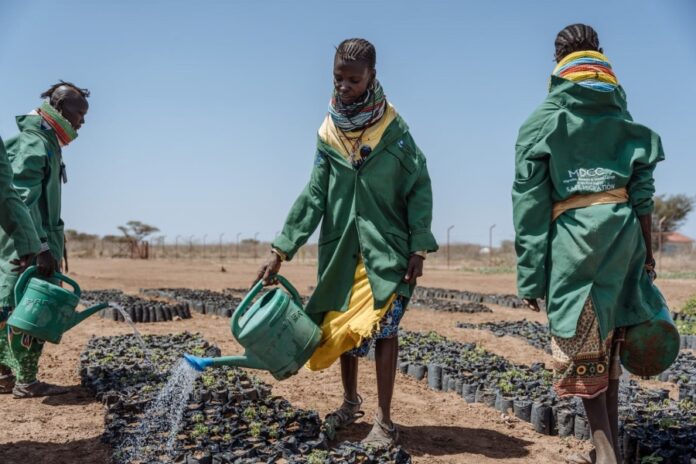In the arid and semi-arid regions of Narok, Kenya, pastoral communities are making significant shifts in their livelihoods to adapt to the changing climate. Leshan Koisikir, a 29-year-old environmentalist, exemplifies this transformation at his Olepolos farm. With a background in Community Health and Development from Moi University, Leshan turned to environmental conservation and agriculture after struggling to find stable employment in his field.
Embracing Agribusiness for Sustainability
Leshan’s 20-acre farm, inherited from his father, is a model of diversified agriculture. He cultivates beans, maize, sorghum, vegetables, and sweet potatoes, along keeping bees, poultry, and rabbits. His efforts are bolstered by the proximity of the Ewaso Nyiro River, which provides essential water for irrigation in an area that experiences minimal rainfall. Additionally, he grows fruit trees like avocados and sweet berries, as well as indigenous trees, underscoring his commitment to both agribusiness and environmental conservation.
Challenges and Community Impact
Despite his success, Leshan faces significant challenges, including a lack of market access for his honey and inadequate professional harvesting equipment. Yet, his work is crucial, especially given the climate crisis that threatens traditional pastoral livelihoods. His father, James Koisikir, also an environmentalist, acknowledges the profound impact of climate change on their community. “Residents now keep livestock in proportion to their land size and are gradually adopting farming,” James notes.
Adapting to Climate Change
Experts like Kennedy Oyugi, an agricultural economist at Africa Harvest, emphasize the importance of short-season crops in ensuring food security for pastoral homes. “Diversification allows pastoralists to harvest crops despite limited rainfall,” Oyugi explains. This adaptation is vital, as agriculture accounts for approximately 40% of human-caused methane emissions, a potent greenhouse gas. Reducing methane emissions is one of the fastest ways to slow global warming, and livestock farming is a major contributor.
Innovative Practices for Emission Reduction
To tackle methane emissions, practices such as maintaining productive herds, selling animals when their productivity declines, feeding livestock protein-rich fodder, and managing manure are recommended. Dr. Joel Onyango from the African Centre of Technology Studies highlights the goal of reducing emission intensity rather than absolute emissions. “The aim is to emit less methane per unit of product,” he says.
Global and Local Efforts
Kenya is a signatory to the global methane pledge, aiming to reduce methane emissions by 30% by 2030. Although Leshan Koisikir may not be aware of this pledge, his daily efforts contribute to this global goal. Roy Bouwer from the African Climate Action Partnership supports the idea of pastoralists diversifying their agricultural practices. “This gradual adaptation increases their income and enhances resilience to climate change,” Bouwer asserts.
Vision for the Future
Leshan envisions his land as a demonstration farm, inspiring others in his community to embrace agricultural diversification. “I want my farm to be a learning center where people can implement new practices on their own land,” he says. By selling livestock and adopting farming, his pastoral community is slowly but surely adapting to the new environmental realities, ensuring both their livelihoods and food security in the face of climate change.
This shift among pastoralists like Leshan Koisikir underscores the broader efforts to mitigate climate change impacts and promote sustainable agricultural practices in Kenya and beyond.
















 The African Research (AR) Index is a comprehensive scholarly directory and database focused explicitly on journal publishers that publish and disseminate African research.
The African Research (AR) Index is a comprehensive scholarly directory and database focused explicitly on journal publishers that publish and disseminate African research.

